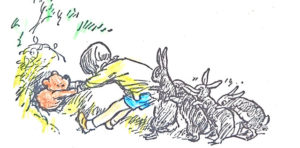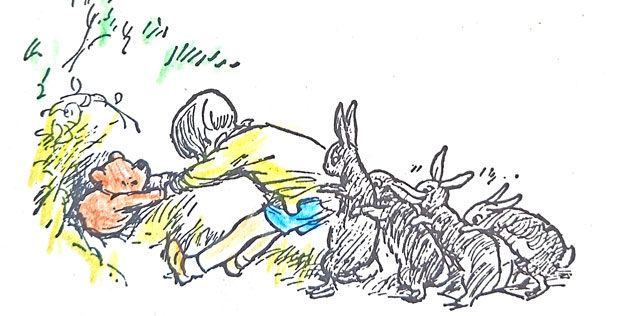EDWARD BEAR, known to his friends as Winnie-the-Pooh, or Pooh for short, was walking through the forest one day, humming proudly to himself.
友達にウィニー・ザ・プーとして知られているプーさんはある日、誇らしげにハミングしながら森を散歩していました。
He had made up a little hum that very morning, as he was doing his Stoutness Exercises in fron of the glass:
彼はその日の朝、鏡の前で痩せる運動をしながら、ちょっとした歌を作っていました。
Tra-la-la, tra-la-la, as he stretched up as high as he could go,
出来るだけ高くストレッチしながら、トゥラララ・トゥラララ
and then Tra-la-la, tra-la ー oh, help! ー la, as he tried to reach his toes.
そしてつま先まで手を伸ばしながら、トゥララ、トゥララーアッ!助けて!ーラッ。
After breakfast he had said it over and over to himself until he had learnt it off by heart,
朝食後、何度も何度も繰り返して、
and now he was humming it right through, properly.
今では彼はきちんと歌えています。
It went like this:
それはこんな歌です。
Tra-la-la, tra-la-la,
トゥラララ・トゥラララ
Tra-la-la, tra-la-la,
トゥラララ・トゥラララ
Rum-tum-tiddle-um-tum.
ランタム・ティドゥランタム
Tiddle-iddle, tiddle-iddle,
ティドゥーリドゥル、ティドゥーリドゥル
Tiddle-iddle, tiddle-iddle,
ティドゥーリドゥル、ティドゥーリドゥル
Rum-tum-tum-tiddle-um.
ランタムタム、ティドゥラム
Well, he was humming this hum to himself, and walking along gaily, wondering what everybody else was doing, and what it felt like, being somebody else, when suddenly he came to a sandy bank, and in the bank was a large hole.
さて、プーさんがハミングしながら、他のみんなはどうしいるだろう、他の誰かになるってどんな感じだろうと思っていると、突然彼は砂の土手のところに出ました。
その土手には大きな穴がありました。
“Aha!” said Pooh. (Rum-tum-tiddle-um-tum.)”If I know anything about anything, that hole means Rabbit,” he said, “and Rabbit means Company,” he said, “and Company means Food and Listening-to-Me-Humming and such like. Rum-tum-tum-tiddle-um.”
「あは!(ランタムティドゥラムタム)もしボクが何かを知っているなら、その穴はラビットだ。ラビットなら友達だ。そして友達といえば食べ物とかボクのハミングを聞いてくれるとかってことだ。ランタムタムティドゥラム」と、プーは言いました。
注)mean :意味する、~ということだ
注)company : 仲間、友達
注)such like :そのようなもの(前の語句を受ける代名詞)
So he bent down, put his head into the hole, and called out:
それで彼は身をかがめて、穴の中に頭を入れて、叫びました。
“Is anybody at home?”
「誰かいる?」
There was a sudden scuffling noise from inside the hole, and then silence.
突然あわてて走る音が穴の中から聞こえて、静かになりました。
“What I said was, ‘Is anybody at home?’ ” called out Pooh very loudly.
「誰かいる?」って言ったんだよ。プーは大声で叫びました。
“No!” said a voice, and then added, “you needn’t shout so loud. I heard you quite well the first time.”
「誰もいない!」と声がして、「そんなに怒鳴らないでよ。初めから聞こえてるよ。」と、付け加えました
“Bother!” said Pooh. “Is there anybody here at all?”
「ちぇっ! ここには本当は誰かいるの?」と、プー。
注)add :付け加える
注)the first time :一回目で
注)Bother! : チェッ! (プーさんの口ぐせ)
“Nobody.”
「誰もいないよ。」
Winnie-the-Pooh took his head out of the hole, and thought for a little, and he thought to himself,
プーさんは穴から頭を出して、ちょっと考えました。
“There must be somebody there, because somebody must have said ‘Nobody.'” So he put his head back in the hole, and said:
誰かいるに違いない。『誰もいないよ』って言ったんだから。プーはそう考えて、再び穴の中に頭を入れて、言いました。
“Hallo, Rabbit, isn’t that you?”
「やあ、ラビット。君じゃないの?」
“No,” said Rabbit, in a different sort of voice this time.
「ボクじゃないよ。」今度は違った声でラビットは言いました。
“But isn’t that Rabbit’s voice?”
「でもラビットの声だよね?」
“I don’t think so,” said Rabbit. “It isn’t meant to be.”
「違うと思うよ。そんなはずない。」とラビットは言いました。
must は確率の高い推量、「~にちがいない」
注)a different sort of voice :違った種類の声
注)be meant to be : ~であることになっている、~のはずだ
(否定になれば、「~であるはずがない」となります。)
It isn’t meant to be. : そんなはずない
“Oh!” said Pooh.
「あら!」とプーは言いました。
He took his head out of the hole, and had another think, and then he put it back, and said:
彼は穴から頭を出して、もう一度考えて、頭を戻して言いました。
“Well, could you very kindly tell me where Rabbit is?“
「よかったらラビットがどこにいるか教えてくれない?」
注)could you very kindly ~? : とても丁寧な依頼文です。
tell me where Rabbit is : ラビットがどこにいるか教える (間接疑問文)

続きはこちらです。fa-arrow-down




コメント